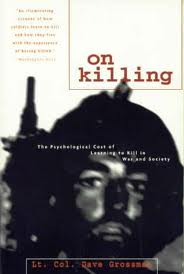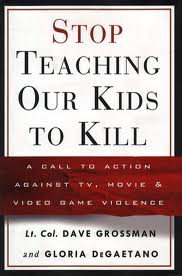“On Killing”
By Colonel David Grossman
In today’s world, this may seem like an impossible thesis t
today’s world, this may seem like an impossible thesis t o defend: “Human beings are hard-wired NOT to kill.” However, the man who said it, Colonel David Grossman, probably knows what he’s talking about. He’s a former West Point psychology professor, Professor of Military Science, and an Army Ranger who was asked by the Army to increase the “kill ratio” of infantry soldiers. His book, “On Killing”, describes his startling findings, the ways he successfully implemented them for the Army, and the implications for us today. He learned that in past wars, soldiers would intentionally miss their target, fire wildly into the air, or refuse to shoot at all, even in the “kill or be killed” situation of heavy combat. His research showed that (with the small exception of clinical psychopaths) people do not want to kill or injure other people and will avoid it at all costs. This natural aversion can be reduced through a variety of methods… reducing the humanity of the target, increasing the distance to the target, rehearsing the act of killing, increasing the “moral force” behind the reason to kill, and other means. The soldiers conditioned by this approach paid a heavy psychological price. However, after employing these methods in training, the Army’s kill ratio skyrocketed.
o defend: “Human beings are hard-wired NOT to kill.” However, the man who said it, Colonel David Grossman, probably knows what he’s talking about. He’s a former West Point psychology professor, Professor of Military Science, and an Army Ranger who was asked by the Army to increase the “kill ratio” of infantry soldiers. His book, “On Killing”, describes his startling findings, the ways he successfully implemented them for the Army, and the implications for us today. He learned that in past wars, soldiers would intentionally miss their target, fire wildly into the air, or refuse to shoot at all, even in the “kill or be killed” situation of heavy combat. His research showed that (with the small exception of clinical psychopaths) people do not want to kill or injure other people and will avoid it at all costs. This natural aversion can be reduced through a variety of methods… reducing the humanity of the target, increasing the distance to the target, rehearsing the act of killing, increasing the “moral force” behind the reason to kill, and other means. The soldiers conditioned by this approach paid a heavy psychological price. However, after employing these methods in training, the Army’s kill ratio skyrocketed.
But Grossman didn’t stop there. He went on to describe how today’s society is employing exactly the same techniques in entertainment, sports, and politics every day, and warned that it will only get worse unless we make a conscious effort to change.
The original “On Killing” was nominated for the Pulitzer Prize, has been translated into Japanese, Korean, and German, is on the Marine Corps Commandant’s required reading list, and is required reading at the FBI academy and beyond. The revised edition includes information on 21st-century military conflicts, recent trends in crime, suicide bombings, school shootings, and more.
Book Spotlight Bonus!
“On Killing” dealt with why people don’t kill and how to make them kill more effectively, but G rossman only touched on the larger societal effects in one chapter at the end. The obvious implications led him to write “Stop Teaching Our Kids To Kill”, a much broader analysis of Grossman’s findings on our larger society.
rossman only touched on the larger societal effects in one chapter at the end. The obvious implications led him to write “Stop Teaching Our Kids To Kill”, a much broader analysis of Grossman’s findings on our larger society.











